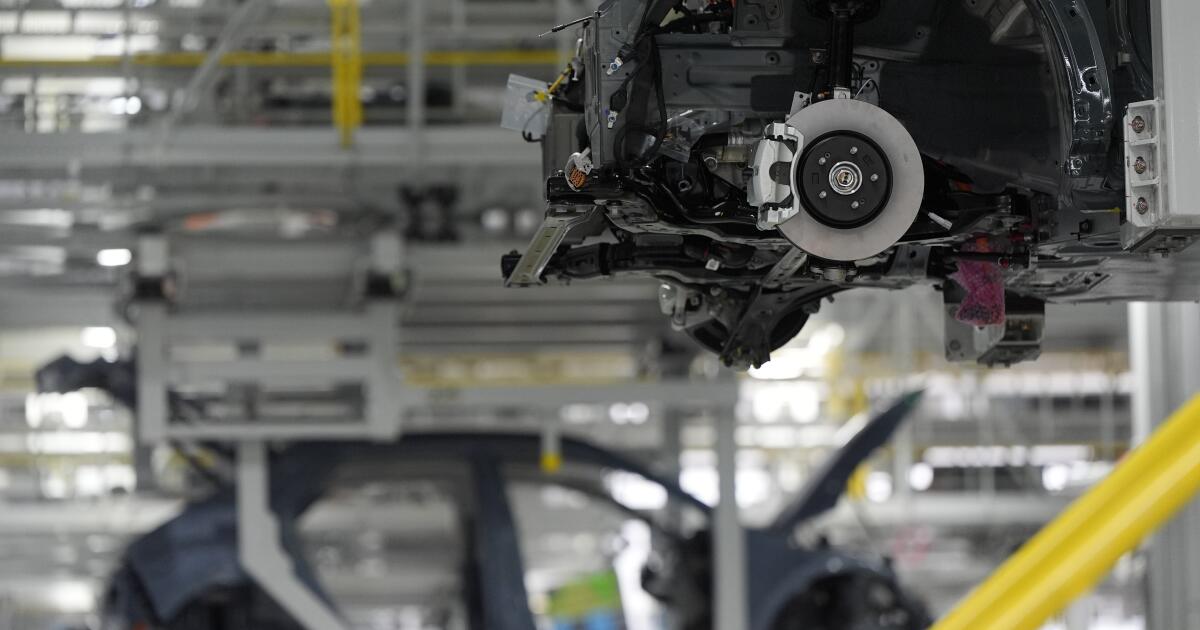A nonprofit organization on Friday sued Orange County-based carmakers Hyundai and Kia, alleging the companies have been violating state law against unfair competition with the use of exploited labor from children, immigrants and inmates.
Jobs to Move America filed a lawsuit in Los Angeles County Superior Court accusing Fountain Valley-based Hyundai and Irvine-based Kia of using cheap labor in supply chains, then masking the practice to obtain contracts from public agencies in California.
State Sen. Maria Elena Durazo (D-Los Angeles) and Los Angeles City Councilmember Hugo Soto-Martinez warned Friday at a news conference with plaintiffs that the companies’ contracts could face trouble with public agencies if the allegations are proven.
Hyundai and Kia did not immediately respond to requests for comment. But Meredith Stewart, a litigation director with Alabama-based Jobs to Move America, said the automakers have “engaged in severe labor exploitation, including coerced prison labor, child labor and migrant labor with working conditions that led to higher safety issues and death.”
Stewart said the companies have used labor from prisons in Alabama and Georgia, which she argued “likely violates the constitutional prohibition against cruel and unusual punishment.”
She further alleged some of the employees are “as young as 13,” claiming both companies “maintain close control over their suppliers and do have the power to influence their employment practices.”
The lawsuit seeks a court order preventing the auto manufacturers from receiving certifications their vehicles are made with high-road employment standards until they submit to an independent audit of their supply chain in Alabama and Georgia, according to Stewart.
Plaintiff attorney Brian Olney said, “This case is about the dirty secret behind the clean electric vehicles Hyundai is selling to government agencies. … Hyundai uses children to build its vehicles, who aren’t even old enough to drive a car themselves … Hyundai relies on prison labor, forced labor and even human trafficking.”
Former Hyundai employee Mark Miller said at the news conference he helped make parts for the car company in Montgomery, Ala., and alleged, “There was nothing safe. There was no training. It was ‘get on the line, get the parts and get them out the door no matter what.’”
Whether an employee was sick or injured didn’t matter, Miller said, adding, “I got hurt a couple of times. They’ve got something going with the state. I don’t know what it is, but nobody was ever treated right. Mostly the inmates.
“I mean, there was 33 of us. I worked at the plant for 14 months…. There was no training, no nothing. They told us [to] get on the line, figure it out and get them consoles out the door. It was one of the worst jobs I’ve ever had in my life. There is no safety at Hyundai, there’s no training. There’s no nothing. Just work and get it out the door.”
Another former Hyundai employee, Rosalinda Soriano-Torres, said the job she was recruited for soon turned into manual labor.
“The work was exhausting and the personal protective equipment was minimal … and the working conditions were dangerous,” she said, adding that immigrants were paid less than U.S. citizens for the same job. “I wanted to quit, but if I lost my job I’d lose my visa.”
When Soriano-Torres got pregnant and asked for a less risky job she was fired, she alleged.
“If these allegations are true we have a serious problem,” Durazo said. “I have questions that need answers. … How can our public agencies purchase vehicles from a company whose supply-chain practices would be illegal here? And what message does it send if we continue business as usual? The state of California needs to investigate.”
Soto-Martinez agreed.
“If these allegations are true, it would absolutely affect our purchasing decisions in the city of Los Angeles,” the councilmember said. “Dignity, fairness and respect for every worker — these are the values of our city. … We will not tolerate anti-worker practices, not here, not anywhere.”

